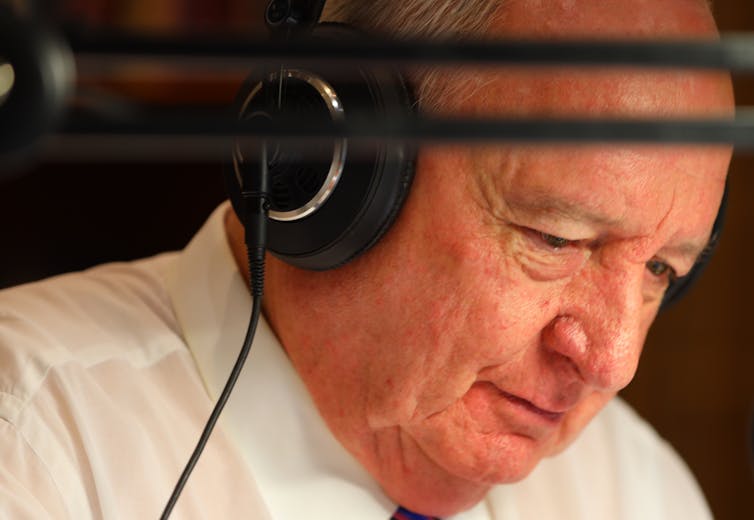The times suited him, then passed him by: the Alan Jones radio era comes to an end
With his defence of those on “struggle street” mixed with a hectoring and bullying style, Jones exerted enormous influence on Australian public life and its media landscape. But ultimately, progress ran over the top, argues Denis Muller in this crossposting from The Conversation.
Time has finally caught up with Alan Jones. Time as measured in years, but not time as measured by social and attitudinal change.
It is remarkable that his recipe of nostalgia, bullying and reactionary politics, all delivered in a ranting, hectoring style, is as successful today as it has been for the whole 35 years of his career in radio broadcasting.

AAP/Kris Durston
Two hundred and twenty-six ratings wins in the highly competitive Sydney breakfast radio market is testament to that.
And power. Former Prime Minister John Howard, said in a tribute that Jones had been the most influential radio broadcaster during his time in politics, a period of 33 years.


Goodbye, farewell to the past – well overdue.
Quite telling the demographic of Jone’s audience cited also mirrors similar in the US with Trump and UK with Brexit. Strategy of appealing to and leveraging those (led to be) uncomfortable with inevitable demographic and societal change, often on behalf of others for political purposes.
Jones was gifted power by people like Carr and others who were cowed. Why would Howard give him so much love? Because he promoted themes that dovetailed very often with Howard’s preferences. In fact Jones had a tiny audience and one that he was beholden to, rather than the other way round.
The lesson of Jones is to ignore these noisemakers and for leaders to try a bit of leadership.
How could Alan Jones have topped the radio ratings and have let the times pass him by? This is an easy conclusion to make from someone of a progressively, critical lens. Instead the truth is that standards and expectations have fragmented, with the obviously a significant sway of people (older, but also economically and culturally diverse) still gravitating with him, but his language no longer acceptable in today’s hyper-sensitive political vernacular. To discount this is to ignore that a significant percentage of our country is made up of baby boomers and more.
Also, concluding that his retirement “may” be do with the advertising boycott without actual evidence is quite laughable from someone who supposedly advocates the advancement of journalism. Sure the temporary boycott of Alan Jones took a hit on ad revenue, but he is also 79 years old and has undergone bouts of serious surgery. As the latter his Jones’ personal reason and there is nothing tangible to counter this it’s foolish at this point to assert otherwise.
Lastly, re-writing history about Kevin 07 are we? Rudd came into office on the image of Howard 2.0, offering fresh face and in his own words “fiscal conservatism”- sounds pretty relaxed and comfortable and me. The debate on climate change developed after the election, with even Howard casually agreeing implement to an Emissions Trading Scheme at the time. was calculated to make Australians feel anything but relaxed and comfortable.
If this writer wants to be critical of Jones by all means go ahead. However it’s a little rare that this article positions itself as the source of truth on Jones, when ironically has the same cracks and errors in argumentation that is so often applied to him. Instead it’s political slander at its most basic.